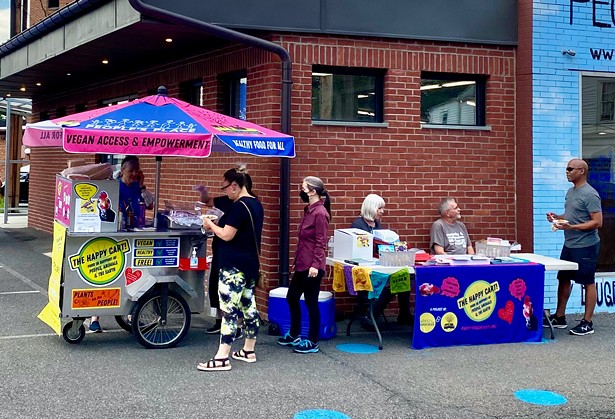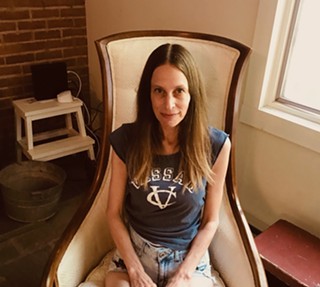
One of my favorite things about being this magazine’s health and wellness editor, a post I’ve held for 11 years, is meeting some of the incredible human beings who work in healing spaces. It’s a thrill to be able to shine a light on these forces of nature. So, as I wind down my time at Chronogram and prepare to pass the torch to the next editor, I’m spotlighting a whole constellation of them. Meet the first trio here—and watch this space next month for a few more local health-and-wellness dynamos.
Rebecca Moore
Animal/Human Rights and Vegan Activist
Work in the world: Moore has tried all forms of activism. But nothing has been as satisfying as cofounding the Institute for Animal Happiness—a micro-sanctuary for ailing chickens in Woodstock—with her partner Brian Normoyle. “It was my way of responding to all the brutality [in the world] by doing a kind of radical care—caring for the ones that nobody thinks are deserving of care,” she says. “When people see this level of care being given to a bird that’s slaughtered by the billions and whose suffering has been so invisible-ized, it’s educational, even transformative. We’re responding to the chickens’ needs as sentient, feeling beings.” The institute is equally dedicated to the wellbeing of its human caregivers. “Through giving care, we heal ourselves,” says Moore, whose organization also puts on the Hudson Valley Vegfest event and publishes the Hudson Valley Vegan Guide.
But there’s always more to do to get the word out. One of Moore’s latest projects is the Happy Cart, a food cart behind People’s Place in Kingston that serves free vegan fare every Wednesday, 4 to 6pm, to anyone who wants it. The result of a collaboration between the Institute for Animal Happiness, Christine Hein and the staff at People’s Place, and Miriam Chisholm at NY Farm Animal Save, the Happy Cart hopes to win over the hearts (and tastebuds) of people who wouldn’t necessarily choose to eat vegan, by showing how good a plant-based diet can be. On an information table next to the cart (which was donated by local plant-based food advocates Kirsti Gholson and Chris Kerr) are free books about veganism, social justice, and more from Lantern Publishing, where Normoyle works. “It’s a little cart doing a lot of work,’’ say Moore.
Biggest passions: “I want to help people have that vegan lightbulb moment,” says Moore. “My father passed away of a heart attack while he was leaving a junk-food restaurant, after eating burgers and ice cream. Since then, it’s been my mission to help people understand that there are healthier alternatives out there.” Personal health is just the beginning: Going vegan reduces animal suffering, protects against climate change, and can even help prevent the pandemics like COVID-19, which may be linked to microbes passed between people and (other) animals.
On being a changemaker: “I feel like caring works best, and healing happens best, when it’s a holistic approach for everyone in the space or community,” says Moore. But she doesn’t want to be called a hero for what she does. “In our society, we sort of hero-ize people just for doing the right thing,” Moore adds. “It should be normal to do the right thing.”
Bit of advice: To those hesitant to change their diet, Moore says, “You may think the meat on your plate tastes good, but really what makes it good is the vegetables around it, the spices, the salt. When you take those out, it’s not very good. A cauliflower steak can be amazing with the same spices.” Skeptical? Come to the Happy Cart for a taste of People’s Place chef Kim Prottas’s (or a guest chef’s) food. “We’re now at about 1,200 free vegan servings of food. We serve 50 to 60 people per week. And the food is delicious.”
Moraya Seeger DeGeare
Therapist–ActivistWork in the world: Seeger DeGeare is a licensed marriage and family therapist who specializes in therapy for mixed-race, LGBTQIA, and same-sex couples and individuals. Based in Beacon, she’s certified in Emotionally Focused Therapy—“a clinically tested model that looks at the dynamic between the couple and where you’re getting stuck,” she explains. Often it involves looking at racial trauma, culture, and mixed-race identity development. Seeger DeGeare also consults in the diversity and inclusion space, helping people better understand their own complex layers of identity, and writes a sex and relationship advice column for Refinery29.
Biggest passions: Activism and identity development are lightning rods for her energy, and she loves bringing the two together. “I was raised as a seeker,” explains Seeger DeGeare, granddaughter of legendary folk singer–activist Pete Seeger. “The through line for me is looking at culture first, and then your identity within the dynamic in which you grew up…but also the system around you. It’s understanding yourself within that system, and the impact of that system on the self. That’s why my activism work is part of my wellness. It’s all connected.”
On being a changemaker: For the past three years on July 4, Seeger DeGeare has led a “chalk-art activism” event that engages kids and grownups to have deeper conversations about everything from racism and transphobia to sexism and climate change. This year, she has a new project inspired by the Pete Seeger “forever stamp” released by the U.S. Postal Service on July 21. Called #StampOutHate, it’s a letter-writing campaign to encourage intergenerational conversations about systemic issues.
“My cousin [artist–activist Dio Cramer] designed these beautiful, Hudson Valley–inspired postcards, and my goal is [to fundraise enough] to print 50,000 of them,” she says. The idea is to write about an issue you’re passionate about and send the postcard off to anyone, be it your aunt who said something racist at Thanksgiving, or a public figure who can make a difference (the website has writing prompts). “I want these to facilitate that conversation,” she says of the postcards, which are available to groups, businesses, and organizations (e.g., teachers, book groups, restaurants, and shops) to disseminate to the community. She’s also a champion of the lost art of letter writing. “I’m such an advocate for buying stamps and writing letters,” notes Seeger DeGeare. “I write two postcards a week to friends. I’m, like, intense about it.”
Bit of advice: Make activism a part of your wellness—you’ll feel better if you do. “Being appropriately angry and trying to do something about it is actually therapeutic in nature,” she says. “I would love activism to be on someone’s self-care list, just as high as drinking water or going for a walk or doing Pilates.”
Jaimee Arnoff
PhD, PsychologistWork in the world: Sharing a therapy space—BFF Therapy—with Seeger DeGeare, Arnoff (aka Dr. Jaimee) is a licensed clinical psychologist who works with kids and young adults, as well as with Deaf and Hard of Hearing people of all ages. Fluent in American Sign Language (ASL), she offers trainings through Hudson Valley Professional Development for mental health providers and employers who work with Deaf and Hard of Hearing individuals. Among her many side gigs, Arnoff works with the grassroots organization James’s Warriors speaking to groups about suicide awareness and prevention. “We’re doing the best we can to get out to any school or group that will listen and welcome a conversation about young people’s mental health,” she says.
Biggest passions: As one of the only child psychologists in the Hudson Valley, and one of the few ASL-fluent local therapists for Deaf individuals, Arnoff can only help so many clients—so she’s passionate about using her trainings to do the most good in the least amount of time. In addition to helping people serve as ethical and competent providers or employers to deaf individuals, she also trains providers (as many as 50 or 100 at a time) in how to work with young people at high risk for suicide or self-harm. “I also do consultations just to spread the message and support as many people as I can,” she says.
On being a changemaker: In her work in the Deaf community, Arnoff takes an approach of transparency and humbleness. “I acknowledge my limitations as an individual who is hearing and has hearing privilege and was raised accordingly,” she says. “I’m never going to be offended if someone is looking to me as a liaison to connect with someone that’s a better fit for them [such as a deaf provider].” Similarly, she takes on the connector role in her work with high-risk kids and teens. “Having connections between schools and local clinicians is really important,” she says, “so that we can wrap around these students and their families with support.”
Bit of advice: Conversations about suicide and self-harm are not easy, but Arnoff encourages people not to shy away from talking about the tough stuff. “Sometimes people have heard horror stories or seen things in the media that are not all accurate, or they use their own imagination and fear of the unknown, and that prevents them from sharing their true feelings,” she says. “Then they suffer in silence. That’s just not something that anyone, but especially a kid, should feel like they have to do.” (If you or someone you know is experiencing mental health-related distress, contact the national Suicide and Crisis Lifeline by calling or texting 988 to connect with a trained counselor for free, 24/7.)














